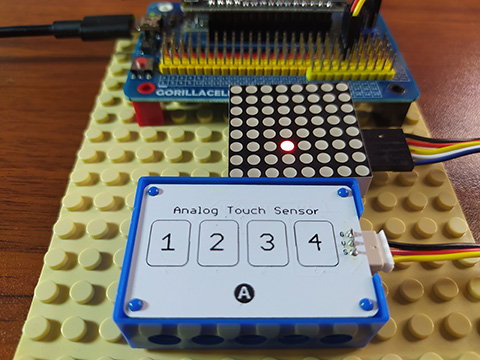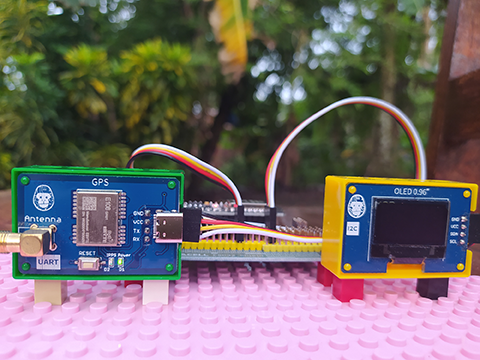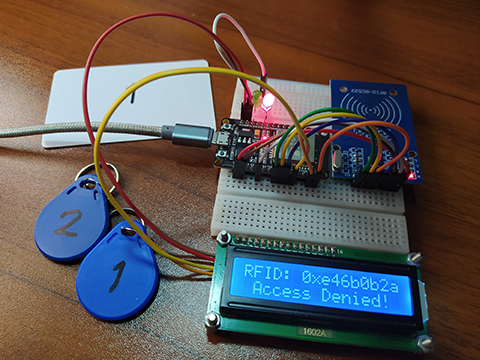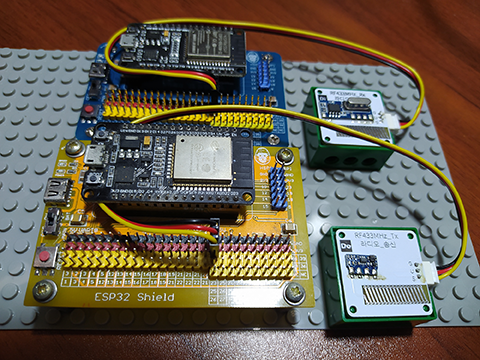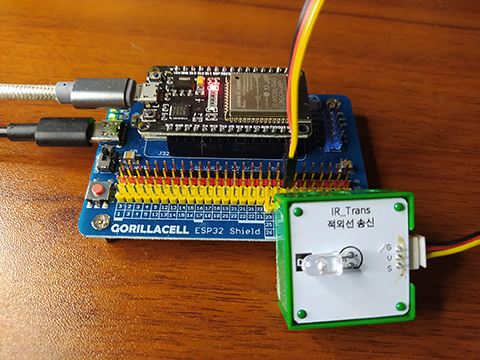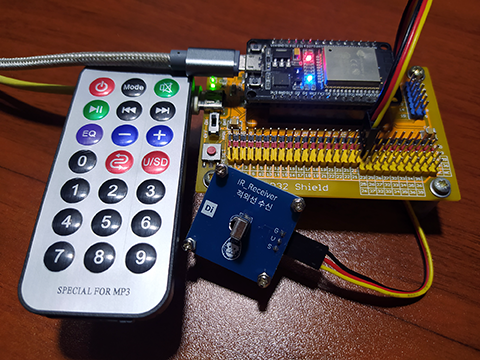027 – MicroPython TechNotes: Rotary Encoder
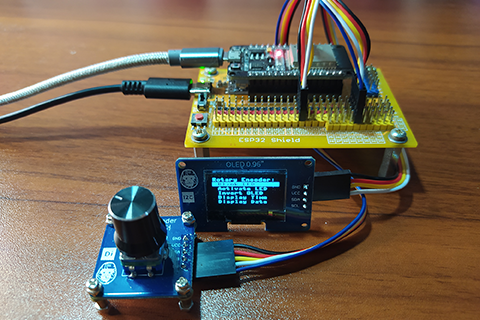
In this article, we will learn how to use ROTARY ENCODER module with ESP32 using MicroPython programming language.
PINOUT:
- GND – for the ground pin.
- VCC – for the supply voltage.
- SA – for the signal pin A.
- SB – for the signal pin B.
- SW – for the signal pin from the push button switch.
BILL OF MATERIALS:
- ESP32 development board that will serve as the brain for the experiment.
- Gorillacell ESP32 shield to extend ESP32 board to pin headers for easy circuit connection.
- 5-pin female-female dupont wires to attach the Rotary Encoder module to ESP32 shield.
- Rotary Encoder module from Gorillacell ESP32 development kit.
HARDWARE INSTRUCTION:
- First, attach the ESP32 board on top of the Gorillacell ESP32 shield and make sure that both USB ports are on the same side.
- Next, attach dupont wires to the Rotary Encoder by following a color coding which is black for the ground, red for the VCC, yellow and the following colors for the signal pins.
- Next, attach the other end of the dupont wires to the ESP32 shield by matching the colors of the wires to the colors of the pin headers. I choose GPIO 32, GPIO 33, and GPIO 34 for the pin SA, pin SB, and pin SW respectively.
- Next, power the ESP32 shield with an external power supply with a type-C USB cable and make sure that the power switch is set to ON state.
- Lastly, connect the ESP32 to the computer through a micro USB cable.
SOFTWARE INSTRUCTION:
- Copy the rotary.py and rotary_irq_esp.py which I renamed as rotary_irq.py and save it to the ESP32 MicroPython Device root directory. The rotary library came from the Github of Mike Teachman: https://github.com/miketeachman/micropython-rotary
- Try the provided example source code, play with it, and adapt it according to your needs. Most of all, enjoy learning. Happy tinkering.
VIDEO DEMONSTRATION:
For any concern, write your message in the comment section.
You might also like to support my journey on Youtube by Subscribing. Click this to Subscribe to TechToTinker.
Thank you and have a good days ahead.
See you,
– George Bantique | tech.to.tinker@gmail.com
SOURCE CODE:
1. Example # 1, basic example of using the Rotary Encoder:
# More details can be found in TechToTinker.blogspot.com
# George Bantique | tech.to.tinker@gmail.com
from machine import Pin
from time import sleep_ms
from rotary_irq import RotaryIRQ
r = RotaryIRQ(pin_num_clk=32,
pin_num_dt=33,
min_val=0,
max_val=19,
reverse=True,
range_mode=RotaryIRQ.RANGE_WRAP)
sw = Pin(34, Pin.IN)
val_old = r.value()
isRotaryEncoder = False
while True:
if sw.value()==1:
isRotaryEncoder = not isRotaryEncoder
if isRotaryEncoder==True:
print('Rotary Encoder is now enabled.')
else:
print('Rotary Encoder is now disabled.')
if isRotaryEncoder==True:
val_new = r.value()
if val_old != val_new:
val_old = val_new
print('result = {}'.format(val_new))
sleep_ms(200)
How the code works:
from machine import Pin
Imports the Pin class from the machine module for accessing the ESP32 GPIO pins.
from time import sleep_ms
Imports the sleep_ms class from the time module to create delays in milli seconds resolution.
from rotary_irq import RotaryIRQ
Imports RotaryIRQ class from rotary_irq library to handle reading the Rotary encoder signals.
r = RotaryIRQ(pin_num_clk=32,
pin_num_dt=33,
min_val=0,
max_val=19,
reverse=True,
range_mode=RotaryIRQ.RANGE_WRAP)
Creates a RotaryIRQ object named “r” with pins connected to GPIO 32 and GPIO 33.
min_val and max_val sets the number of steps rotary encoder can have.
reverse=True sets an increasing value when the rotary encoder is rotated clockwise and a decreasing value when the rotary encoder is rotated in counter clockwise direction. You may change this to False if you want the other way around.
range_mode sets returned value of the library to wrap around between its maximum step value (max_val) and minimum step value (min_val) and vice-versa.
sw = Pin(34, Pin.IN)
Creates a Pin object named “sw” which is connected to GPIO 34 with a pin direction set as input.
val_old = r.value()
Reads the current value of the rotary encoder and store it to the val_old variable for comparison later on.
isRotaryEncoder = False
Create a variable isRotaryEncoder and sets its default value to False. This defaults to disabling the reading of rotary encoder.
while True:
Creates an infinite loop
if sw.value()==1:
isRotaryEncoder = not isRotaryEncoder
if isRotaryEncoder==True:
print(‘Rotary Encoder is now enabled.’)
else:
print(‘Rotary Encoder is now disabled.’)
Checks if the push button switch of the rotary encoder.
if isRotaryEncoder==True:
val_new = r.value()
if val_old != val_new:
val_old = val_new
print(‘result = {}’.format(val_new))
And if the isRotaryEncoder is set to True, then display the rotary encoder values.
2. Example # 2, using the Rotary Encoder to control a menu displayed in 0.96 OLED display:
# More details can be found in TechToTinker.blogspot.com
# George Bantique | tech.to.tinker@gmail.com
from time import sleep_ms
from time import ticks_ms
from rotary_irq import RotaryIRQ
from machine import Pin, SoftI2C
from machine import RTC
from ssd1306 import SSD1306_I2C
led = Pin(2, Pin.OUT)
rsw = Pin(34, Pin.IN)
i2c = SoftI2C(scl=Pin(22), sda=Pin(21), freq=400000)
oled = SSD1306_I2C(128, 64, i2c, addr=0x3C)
r = RotaryIRQ(pin_num_clk=32,
pin_num_dt=33,
min_val=0,
max_val=19,
reverse=True,
range_mode=RotaryIRQ.RANGE_WRAP)
val_old = r.value()
rtc = RTC()
rtc.datetime((2021, 4, 11, 0, 10, 12, 0, 0))
# rtc.datetime((YYYY, MM, DD, WD, HH, MM, SS, MS))
# WD 0 = Monday
# WD 6 = Sunday
menus = ['Blink LED',
'Activate LED',
'Invert OLED',
'Display Time',
'Display Date',
'Display Weekday',
'Menu 6',
'Menu 7',
'Menu 8',
'Menu 9',
'Menu 10',
'Menu 11',
'Menu 12']
working_idx = 0
sel_menu_idx = 0
menu_idx = 0
prev_time = ticks_ms()
isBlinkLED = False
isActiveLED = False
isInvertOLED = False
isDisplayTime = False
isDisplayDate = False
isDisplayWkday = False
def print_menu(rotary_dir=0):
NUM_MENU_LINE = 5
global menus
global working_idx
global sel_menu_idx
global menu_idx
print_cnt = 0
menu_x_pos = 10 # default x position
menu_y_pos = 10 # default y position, will be updated every menu printed by 10
# Clear the screen
oled.fill_rect(0, 9, 128, 55, 0)
# Create the working index
# It can only have a value of 0 to len(menus)-1
working_idx += rotary_dir
if working_idx < 0:
working_idx = 0
elif working_idx > len(menus) - 1:
working_idx = len(menus) - 1
# Create the selected menu
# It can only have a value of
# 0, 1, 2, 3, 4
# to create 5 lines of menus
if working_idx > 1 and working_idx < len(menus)-2:
sel_menu_idx = 2
elif working_idx == len(menus)-2:
sel_menu_idx = 3
elif working_idx == len(menus)-1:
sel_menu_idx = 4
else:
sel_menu_idx = working_idx
if working_idx < 2:
menu_idx = 0
elif working_idx > len(menus)-NUM_MENU_LINE + 1:
menu_idx = len(menus)-NUM_MENU_LINE
else:
menu_idx = working_idx - 2
for i in range(menu_idx, len(menus), 1):
if print_cnt < NUM_MENU_LINE:
if print_cnt == sel_menu_idx:
#oled.fill_rect(x, y, w, h, col)
oled.fill_rect(0, ( ( ( sel_menu_idx + 1 ) * 10 ) -1 ), 128, 9, 1)
oled.text(menus[i], menu_x_pos, menu_y_pos, 0)
else:
oled.text(menus[i], menu_x_pos, menu_y_pos, 1)
oled.show()
menu_y_pos+=10
print_cnt+=1
# Prints the header
oled.text('Rotary Encoder:', 0, 0)
# Prints the initial menus
print_menu()
while True:
if ticks_ms() - prev_time >= 200:
val_new = r.value()
if val_old != val_new:
if val_old == 0 and val_new == 19:
val_dif = -1
elif val_old == 19 and val_new == 0:
val_dif = 1
else:
val_dif = val_new - val_old
print_menu(val_dif)
val_old = val_new
if rsw.value()==1:
if working_idx==0: # Blink LED
isBlinkLED = not isBlinkLED
isActiveLED = False
if isBlinkLED:
oled.fill_rect(0, 9, 128, 55, 0)
msg = 'Blinking LED'
print('Status: {}'.format(msg))
oled.text(msg, 63-len(msg)*8//2, 40)
oled.show()
else:
print_menu()
elif working_idx==1: # Activate LED
isActiveLED = not isActiveLED
isBlinkLED = False
if isActiveLED:
oled.fill_rect(0, 9, 128, 55, 0)
msg = 'LED activated'
print('Status: {}'.format(msg))
oled.text(msg, 63-len(msg)*8//2, 40)
oled.show()
else:
print_menu()
elif working_idx==2: # Invert OLED
isInvertOLED = not isInvertOLED
oled.invert(isInvertOLED)
oled.show()
elif working_idx==3: # Display Time
isDisplayTime = not isDisplayTime
isDisplayDate = False
isDisplayWkday = False
if isDisplayTime:
oled.fill_rect(0, 9, 128, 55, 0)
t = rtc.datetime()
time = '{:02d}:{:02d}'.format(t[4],t[5])
print('Time: {}'.format(time))
oled.text(time, 63-len(time)*8//2, 40)
oled.show()
else:
print_menu()
elif working_idx==4: # Display Date
isDisplayTime = False
isDisplayDate = not isDisplayDate
isDisplayWkday = False
if isDisplayDate:
oled.fill_rect(0, 9, 128, 55, 0)
t = rtc.datetime()
date = '{:04d}-{:02d}-{:02d}'.format(t[0],t[1],t[2])
print('Date: {}'.format(date))
oled.text(date, 63-len(date)*8//2, 40)
oled.show()
else:
print_menu()
elif working_idx==5: # Display Weekday
isDisplayTime = False
isDisplayDate = False
isDisplayWkday = not isDisplayWkday
if isDisplayWkday:
oled.fill_rect(0, 9, 128, 55, 0)
t = rtc.datetime()
if t[3]==0:
wkday = 'Monday'
elif t[3]==1:
wkday = 'Tuesday'
elif t[3]==2:
wkday = 'Wednesday'
elif t[3]==3:
wkday = 'Thursday'
elif t[3]==4:
wkday = 'Friday'
elif t[3]==5:
wkday = 'Saturday'
elif t[3]==6:
wkday = 'Sunday'
print('Weekday: {}'.format(wkday))
oled.text(wkday, 63-len(wkday)*8//2, 40)
oled.show()
else:
print_menu()
if isBlinkLED:
led.value(not led.value())
elif isActiveLED:
led.value(1)
else:
led.value(0)
prev_time = ticks_ms()
3. rotary.py:
# The MIT License (MIT)
# Copyright (c) 2020 Mike Teachman
# https://opensource.org/licenses/MIT
# Platform-independent MicroPython code for the rotary encoder module
# Documentation:
# https://github.com/MikeTeachman/micropython-rotary
import micropython
_DIR_CW = const(0x10) # Clockwise step
_DIR_CCW = const(0x20) # Counter-clockwise step
# Rotary Encoder States
_R_START = const(0x0)
_R_CW_1 = const(0x1)
_R_CW_2 = const(0x2)
_R_CW_3 = const(0x3)
_R_CCW_1 = const(0x4)
_R_CCW_2 = const(0x5)
_R_CCW_3 = const(0x6)
_R_ILLEGAL = const(0x7)
_transition_table = [
# |------------- NEXT STATE -------------| |CURRENT STATE|
# CLK/DT CLK/DT CLK/DT CLK/DT
# 00 01 10 11
[_R_START, _R_CCW_1, _R_CW_1, _R_START], # _R_START
[_R_CW_2, _R_START, _R_CW_1, _R_START], # _R_CW_1
[_R_CW_2, _R_CW_3, _R_CW_1, _R_START], # _R_CW_2
[_R_CW_2, _R_CW_3, _R_START, _R_START | _DIR_CW], # _R_CW_3
[_R_CCW_2, _R_CCW_1, _R_START, _R_START], # _R_CCW_1
[_R_CCW_2, _R_CCW_1, _R_CCW_3, _R_START], # _R_CCW_2
[_R_CCW_2, _R_START, _R_CCW_3, _R_START | _DIR_CCW], # _R_CCW_3
[_R_START, _R_START, _R_START, _R_START]] # _R_ILLEGAL
_transition_table_half_step = [
[_R_CW_3, _R_CW_2, _R_CW_1, _R_START],
[_R_CW_3 | _DIR_CCW, _R_START, _R_CW_1, _R_START],
[_R_CW_3 | _DIR_CW, _R_CW_2, _R_START, _R_START],
[_R_CW_3, _R_CCW_2, _R_CCW_1, _R_START],
[_R_CW_3, _R_CW_2, _R_CCW_1, _R_START | _DIR_CW],
[_R_CW_3, _R_CCW_2, _R_CW_3, _R_START | _DIR_CCW]]
_STATE_MASK = const(0x07)
_DIR_MASK = const(0x30)
def _wrap(value, incr, lower_bound, upper_bound):
range = upper_bound - lower_bound + 1
value = value + incr
if value < lower_bound:
value += range * ((lower_bound - value) // range + 1)
return lower_bound + (value - lower_bound) % range
def _bound(value, incr, lower_bound, upper_bound):
return min(upper_bound, max(lower_bound, value + incr))
def _trigger(rotary_instance):
for listener in rotary_instance._listener:
listener()
class Rotary(object):
RANGE_UNBOUNDED = const(1)
RANGE_WRAP = const(2)
RANGE_BOUNDED = const(3)
def __init__(self, min_val, max_val, reverse, range_mode, half_step):
self._min_val = min_val
self._max_val = max_val
self._reverse = -1 if reverse else 1
self._range_mode = range_mode
self._value = min_val
self._state = _R_START
self._half_step = half_step
self._listener = []
def set(self, value=None, min_val=None,
max_val=None, reverse=None, range_mode=None):
# disable DT and CLK pin interrupts
self._hal_disable_irq()
if value is not None:
self._value = value
if min_val is not None:
self._min_val = min_val
if max_val is not None:
self._max_val = max_val
if reverse is not None:
self._reverse = -1 if reverse else 1
if range_mode is not None:
self._range_mode = range_mode
self._state = _R_START
# enable DT and CLK pin interrupts
self._hal_enable_irq()
def value(self):
return self._value
def reset(self):
self._value = 0
def close(self):
self._hal_close()
def add_listener(self, l):
self._listener.append(l)
def remove_listener(self, l):
if l not in self._listener:
raise ValueError('{} is not an installed listener'.format(l))
self._listener.remove(l)
def _process_rotary_pins(self, pin):
old_value = self._value
clk_dt_pins = (self._hal_get_clk_value() <<
1) | self._hal_get_dt_value()
# Determine next state
if self._half_step:
self._state = _transition_table_half_step[self._state &
_STATE_MASK][clk_dt_pins]
else:
self._state = _transition_table[self._state &
_STATE_MASK][clk_dt_pins]
direction = self._state & _DIR_MASK
incr = 0
if direction == _DIR_CW:
incr = 1
elif direction == _DIR_CCW:
incr = -1
incr *= self._reverse
if self._range_mode == self.RANGE_WRAP:
self._value = _wrap(
self._value,
incr,
self._min_val,
self._max_val)
elif self._range_mode == self.RANGE_BOUNDED:
self._value = _bound(
self._value,
incr,
self._min_val,
self._max_val)
else:
self._value = self._value + incr
try:
if old_value != self._value and len(self._listener) != 0:
micropython.schedule(_trigger, self)
except:
pass
4. rotary_irq.py (rotary_irq_esp.py):
# The MIT License (MIT)
# Copyright (c) 2020 Mike Teachman
# https://opensource.org/licenses/MIT
# Platform-specific MicroPython code for the rotary encoder module
# ESP8266/ESP32 implementation
# Documentation:
# https://github.com/MikeTeachman/micropython-rotary
from machine import Pin
from rotary import Rotary
from sys import platform
_esp8266_deny_pins = [16]
class RotaryIRQ(Rotary):
def __init__(self, pin_num_clk, pin_num_dt, min_val=0, max_val=10,
reverse=False, range_mode=Rotary.RANGE_UNBOUNDED, pull_up=False, half_step=False):
if platform == 'esp8266':
if pin_num_clk in _esp8266_deny_pins:
raise ValueError(
'%s: Pin %d not allowed. Not Available for Interrupt: %s' %
(platform, pin_num_clk, _esp8266_deny_pins))
if pin_num_dt in _esp8266_deny_pins:
raise ValueError(
'%s: Pin %d not allowed. Not Available for Interrupt: %s' %
(platform, pin_num_dt, _esp8266_deny_pins))
super().__init__(min_val, max_val, reverse, range_mode, half_step)
if pull_up == True:
self._pin_clk = Pin(pin_num_clk, Pin.IN, Pin.PULL_UP)
self._pin_dt = Pin(pin_num_dt, Pin.IN, Pin.PULL_UP)
else:
self._pin_clk = Pin(pin_num_clk, Pin.IN)
self._pin_dt = Pin(pin_num_dt, Pin.IN)
self._enable_clk_irq(self._process_rotary_pins)
self._enable_dt_irq(self._process_rotary_pins)
def _enable_clk_irq(self, callback=None):
self._pin_clk.irq(
trigger=Pin.IRQ_RISING | Pin.IRQ_FALLING,
handler=callback)
def _enable_dt_irq(self, callback=None):
self._pin_dt.irq(
trigger=Pin.IRQ_RISING | Pin.IRQ_FALLING,
handler=callback)
def _disable_clk_irq(self):
self._pin_clk.irq(handler=None)
def _disable_dt_irq(self):
self._pin_dt.irq(handler=None)
def _hal_get_clk_value(self):
return self._pin_clk.value()
def _hal_get_dt_value(self):
return self._pin_dt.value()
def _hal_enable_irq(self):
self._enable_clk_irq(self._process_rotary_pins)
self._enable_dt_irq(self._process_rotary_pins)
def _hal_disable_irq(self):
self._disable_clk_irq()
self._disable_dt_irq()
def _hal_close(self):
self._hal_disable_irq()
REFERENCES AND CREDITS:
https://gorillacell.kr
2. Rotary Encoder library:
https://github.com/miketeachman/micropython-rotary


